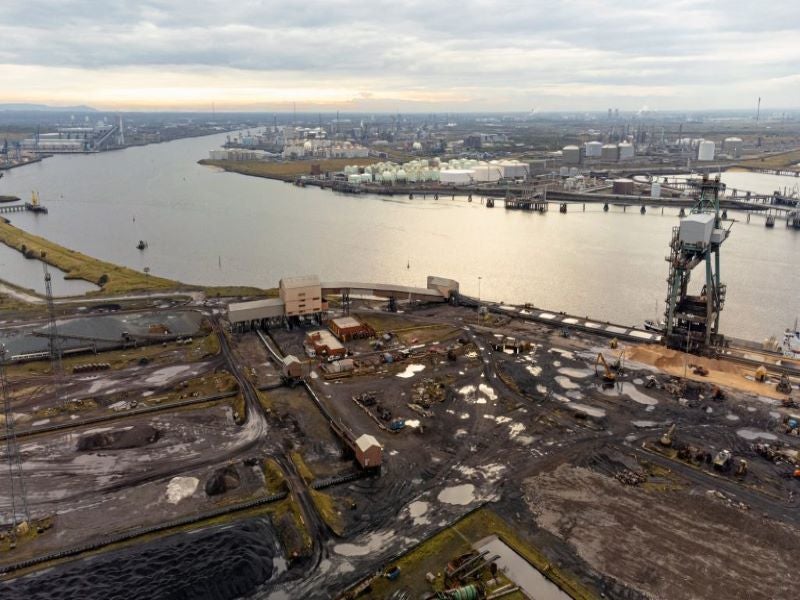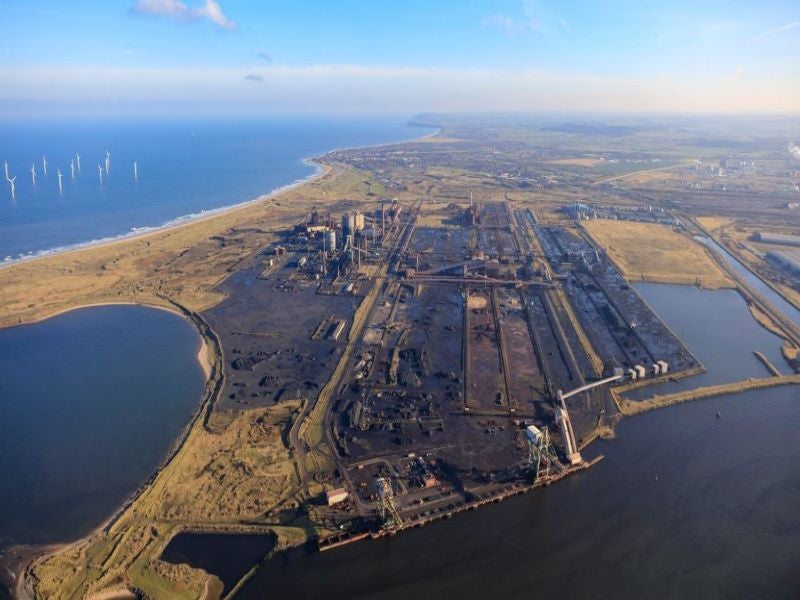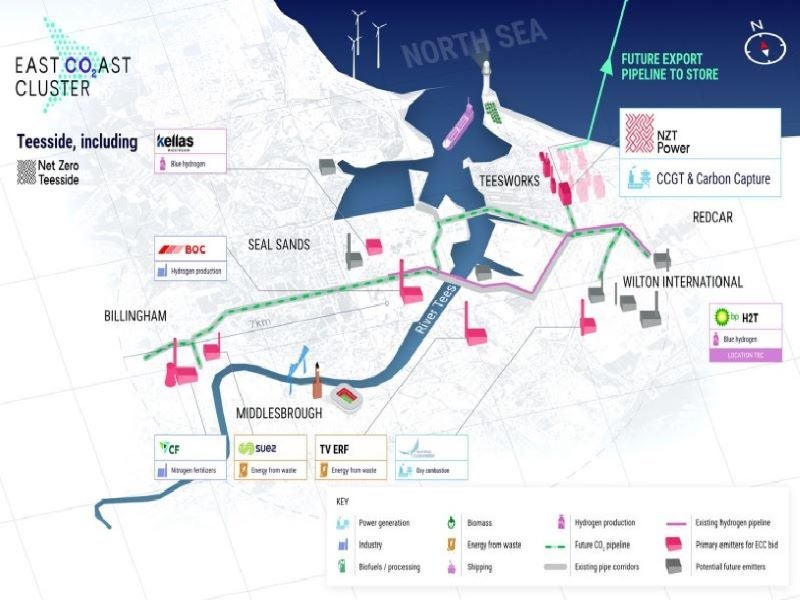Net Zero Teesside is a carbon capture, usage and storage (CCUS) project being developed to decarbonise industrial emissions in the Teesside region of England, UK.
It involves the construction of an 840MW gas-fired power station equipped with carbon capture technology and the establishment of a carbon dioxide (CO2) gathering network to enable low-carbon hydrogen production and power generation in the Teesside area.The project is intended to capture up to ten million tonnes (Mt) of CO2 emissions a year.
Net Zero Teesside is being developed as part of the UK’s East Coast Cluster CCUS infrastructure development project that also includes the Zero Carbon Humber industrial decarbonisation project and the Northern Endurance Partnership (NEP), which will be responsible to transport CO2 from both the projects and permanently store it in a geological aquifer located in the Southern North Sea.
The East Coast Cluster and HyNet North West were the two industrial clusters to receive Track-1 recognition in the first phase of the UK Government’s CCUS Cluster Sequencing process in October 2021. The Track 1 projects are expected to commence operations in the mid-2020s.
Net Zero Teesside partners
BP, Equinor, Eni, Shell and Total are leading the Net Zero Teesside project, with BP as the operator of both the Net Zero Teesside Power and the NEP projects. The companies formed a consortium to advance the development of the project in February 2020.
Other industrial partners of the Net Zero Teesside project include Linde Group’s subsidiary BOC, CF Fertiliser, Suez, Sembcorp, Kellas Midstream and Teesside Valley Energy Recovery Facility (TV ERF).
Funding for Net Zero Teesside
The project secured £28m ($38.8m)of public funding from UK Research and Innovation’s (UKRI) Industrial Decarbonisation Challenge (IDC) fund in March 2021.
Net Zero Teesside Power project details
Net Zero Teesside Power (NZT Power) is an 840MW gas-fired power station planned to be developed in the Teesworks industrial zone through a joint venture partnership between BP and Equinor.
Integrated with carbon capture technology, it will comprise the hub project of the Net Zero Teesside cluster and supply flexible, low carbon electricity to power up to 1.3 million homes. The CO2 emissions from the NZT Power facility will be exported and stored by the Northern Endurance Partnership.
The final investment decision (FID) on the NZT Power project is expected in 2023.
A development consent order (DCO) application for the onshore elements of the Net Zero Teesside project was submitted to the UK’s Planning Inspectorate in 2021.
The onshore elements of the project include the NZT power plant as well as NEP’s CO2 compression and export facilities.
Teesside hydrogen production projects
BP announced plans in March 2021 to construct a 1GW blue hydrogen production facility called H2 Teesside by 2030. An FID on the project is expected in early 2024.
The facility is expected to commence operations with a 500MW hydrogen production capacity by 2027 or earlier.
Integrated with carbon capture technologies, the H2 Teesside facility will utilise the NEP infrastructure to export and store up to 2Mt of CO₂ a year.
BP also separately announced plans in November 2021 to build the HyGreen Teesside green hydrogen production facility by 2030. An FID on the project is anticipated in 2023.
The HyGreen Teesside project is expected to commence operations with a 60MW green hydrogen production capacity in 2025.
Northern Endurance Partnership details
The Northern Endurance Partnership (NEP) was formed in October 2020 to develop offshore CO2 transport and storage infrastructure for the Net Zero Teesside and Zero Carbon Humber projects. BP is the operator of NEP, while the other development partners are Eni, Equinor, National Grid Ventures, Shell and Total.
BP, Equinor and National Grid hold the CO2 appraisal and storage licence covering the Endurance reservoir, which is a saline aquifer located 145km off the coast of Teesside in the UK waters of the North Sea.
NEP secured £24m ($33.3m) funding from UKRI’s IDC fund in March 2021.
Contractors involved
BP, on behalf of the Net Zero Teesside partners, selected two separate consortiums as part of the front-end engineering design (FEED) competition for the NZT Power project and NEP’sCO2 compression and export facilities in Teessidein December 2021.
One of the consortiums is the Technip Energies and General Electric (GE) consortium, whereas the other one includes Aker Solutions, Doosan Babcock and Siemens Energy.
The scope of the FEED study includes design and technical solutions development for NZT Power’s proposed 860MW power station along with a 2Mt per annum (Mtpa) carbon capture facility, and NEP’s planned 4Mpta Teesside high-pressure CO2 compression and export facilities.
The two consortiums will deliver a FEED study each, of which one will be selected to execute the engineering, procurement and construction (EPC) work of the project.The consortium led by Technip Energies will provide FEED to integrate amine-based carbon capture technologies with a gas-fired power plant equipped with GE 9HA.02 gas turbine. Shell Catalysts & Technologies will provide Shell Cansolv® CO2 capture technology and Balfour Beatty will be the UK construction partner for the consortium.
Technip Energies will work on the carbon capture and compression plant, while GE Gas Power will focus on gas-fired power plant engineering and integration.
Aker Solutions, Siemens Energy and Doosan Babcock formed a consortium to develop technology and solutions for the UK CCUS market in September 2021. The consortium tied up with Aker Carbon Capture to utilise CO₂ capture technology with low-solvent degradation and low emissions.





